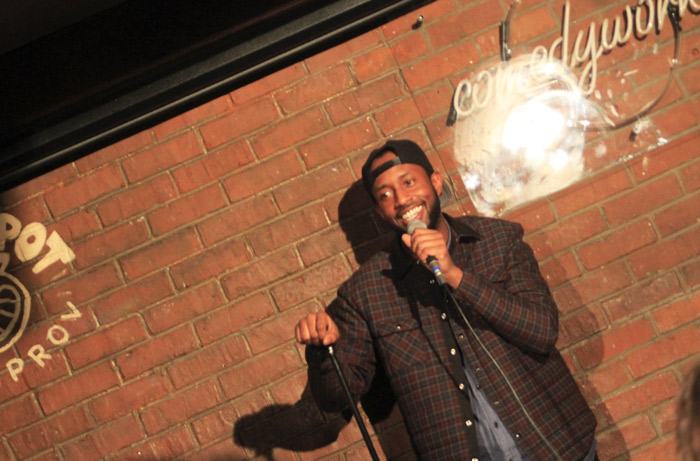Nestled atop a bar on Rue Bishop, Comedy Works is a small and intimate venue reminiscent of old-timey comedy clubs, complete with dim lighting and an exposed brick wall. On Saturday night, the usually low-key club was abuzz, as stand-up veteran and cast member of Kevin Hart’s TV Show Real Housewives of Hollywood, James Davis, was scheduled to headline. Local comic Eddie King and Washington D.C.-based Martin Amini opened for Davis, each bringing their distinct geographical perspectives to an evening of racially-charged comedy.
“I love all the beautiful white faces in the room—it makes me feel good about my career progression,” Davis cracked as he peered out at his audience, encapsulating the night’s tone. King and Amini had each tried to approach this dialogue as well, yet failed to deliver it in a way that was as clever or insightful as Davis’ routine.
King discussed growing up within France’s black community, describing his neighborhood as being “more like a jungle than the Paris you guys have in mind.” He referenced a white kindergarten teacher who made him self-conscious about his racial identity when she reprimanded him for drawing his mother as white, (“Who cares, my father was purple!” he joked). These sound bites were endearing, but a language barrier inhibited him. King is a popular and established French comedian making his debut in the comedy scene. His material is funny, but he is yet to fully grasp the nuances of English that would propel his act to the next level. It’s something that will surely come with practice.
Amini’s following act was funny but less memorable, using oft-heard lines that got some laughs but ultimately didn’t have much weight behind them. The weakness of this performance only allowed Davis to shine that much brighter. Davis began by describing his childhood in an infamously gang-ridden neighbourhood in L.A., describing himself as growing up “hood adjacent.” He dove into the racism he experienced going to a mostly white high school, particularly from the white coaches on his golf team when they discovered he was talented.
“They go from not telling me where they live to inviting me to their homes,” he recalled. “They’re like, ‘Have you seen the movie the Blind Side?’ We wanna do that to you.”
Davis recounted these memories playfully and confidently; his Californian swagger stood in stark contrast to the stereotypically neurotic New York comedian. He even bravely explored his personal family trauma, starting with his father’s abandonment.
“Dads in the black community, something happened—they just separated,” he said. “Chasing my dad is like chasing a girl I have a crush on.”
He continued discussing his personal connection to police brutality in the United States—his uncle was killed by a cop. In response to the Ferguson riots, he exclaimed, “I don’t like the way the U.S .media portrays black riots—like we’re some savages who can’t wait to riot.”
From playing with the stereotypes of the quintessential black friend, to questioning the millennial obsession with political correctness, Davis’s satire was both clever, meaningful, and an important critique of society’s current trepidation in approaching race. His routine was able to make the heartbreaking funny—just what good comedy is supposed to do.









